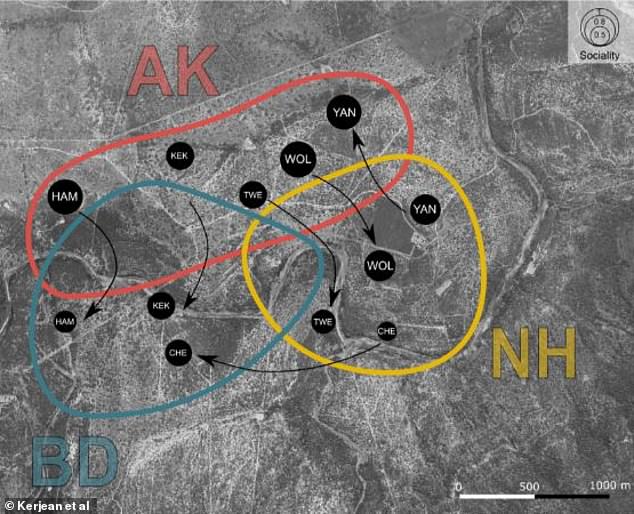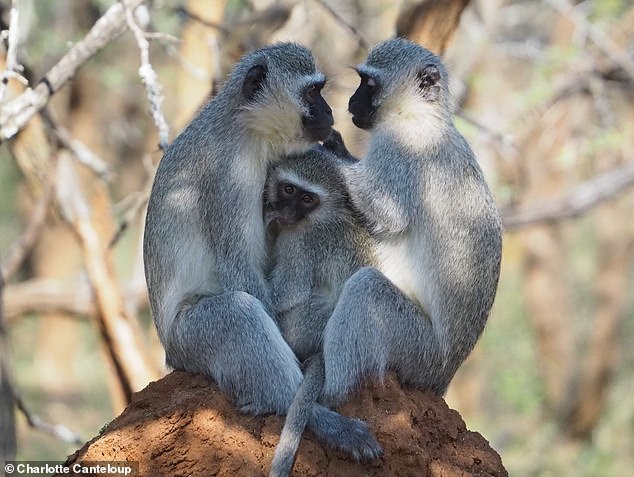Monkeys succumb to peer pressure just like humans, study finds
- The researchers found that groups of vervet monkeys have distinct social traditions
- Males who travel between groups conform to the new pattern under peer pressure
Giving in to your friend's nagging to “just have one drink” at a Christmas party may not be a uniquely human experience, a new study shows.
Research now shows that monkeys, like humans, succumb to peer pressure.
A nine-year study of vervet monkeys found that social traditions are transmitted across different communities of animals.
Scientists from the University of Lausanne in Switzerland and the University of Paul Sabatier in France say that monkeys face a process similar to peer pressure in humans.
This causes males who join more social societies to quickly adapt to fit the social patterns of their new group.
Vervet monkeys succumb to peer pressure just like humans and quickly adopt the social patterns of those around them
The researchers studied nearly 250 vervet monkeys in South Africa over nine years, analyzing data from more than 84,000 social interactions.
The apes lived in three different societies called the Ankhase (AK), Baie Dankie (BD), and Noha (NH), with significant differences in how social the apes were in each.
The AK members would mutually exchange grooming, meaning that when a monkey was wooed it would usually return the favor.
“We found that individuals in one group – AK – displayed significantly more affiliative behaviors than the other two groups, and this difference was consistent over the 9 years of the study,” said Elena Kergin, lead author of the study.
Ms. Kerrigan likens this to a “massage exchange between individuals.”
“If I massage you 100 times a year but you only do it twice, I might feel like our relationship is completely unfair. This is the kind of differences we noticed between our groups,” she added.
What is striking is that when males “dispersed” between groups, they quickly adopted the social patterns of their new habitat.

The researchers looked at three groups of vervet monkeys, the Ankhase (AK), Baie Dankie (BD), and Noha (NH) whose overlapping territories are shown here, and tracked how the males (marked with black dots) moved among them.
For example, a dispersing male who arrives at AK will be 18 percent more sociable than if he had arrived at BD and 15 percent more sociable than if he had arrived at NH.
Social pressures also go both ways, and scholars have observed that males who left the AKP to join other groups soon engaged in less reciprocal grooming.
Primates, including vervet monkeys, have highly advanced social systems and can maintain long and complex relationships with other members of their species.
'All vervet monkeys are social animals and use common social behaviors as grooming to create and maintain social bonds,' Charlotte Canteloupe, co-author of the study, told MailOnline.
Our hypothesis is that males socially conform to the social norms of their new group by mimicking the behavior of their new members. In other words, they are embracing social fashion for their new collection.
This may be due to unconscious imitation or due to pressure from other monkeys.
Either way, Ms. Canteloube says, “they are definitely influenced by others.”

Males who joined groups where social patterns were more demanding became more sociable after joining the group and engaged in greater mutual grooming.
As for why males adapt their behavior to fit in with their group, researchers speculate that this helps them become part of their new society.
“This normative rule — acting like others — may help them integrate better into a new group,” Ms. Kerrigian said.
However, the study also found that females are largely responsible for setting social patterns within the group.
Differences between groups were stronger when the ratio of females to males was higher in the groups.
They suggest that females may serve as “models” for social learning and form the social core of the group.
(Tags for translation)dailymail
